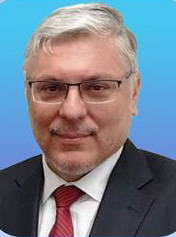
Iraq's prime minister candidate Mohammed Jaafar al-Sadr urged the necessity to implement and abide by the Iraqi constitution to address the current political turmoil engulfing the country and rendering it unable to form its next government.
"We must return in earnest to the origins of the state-building project, the constitution, of which we wrote with the acceptance of it by the majority of people through an elected assembly," Jaafar wrote in an op-ed sent to Rudaw on Saturday, calling on the country's different political alliances to implement the constitution and use it as a basis to resume the stalled government formation process.
Jaafar, picked as a candidate by the repatriate's alliance for the PM post, said that Iraq's different alliances "stumbled" in the constitution's application, and the errors previously committed have made the process of state-building difficult, despite the document containing all the concepts needed to build the country.
He listed the stubbornness of politicians by "clinging to narrow fictional demands and trying to evade the entitlement [of applying the constitution]" as examples of faults committed by the political forces which have drastically deterred proper government formation.
Iraq's political future remains mired by instability. The country has failed to elect a government eight months after holding early elections due to differences between political parties which have stalled the formation process.
The 2005 Iraqi constitution dictates that when the election results are confirmed, a motion is set in place for the winning parties to form a government. Within 15 days of the ratification of the results, the current president calls on parliament to elect a speaker and two deputies by an absolute majority,
However, it had so far only elected the parliament speaker and his two deputies.
Jaafar stated that the "document [constitution] outlines for us the features of the state: politically, socially, economically, security, rights, and duties, organization of powers," but regrettably continued that Iraq's politicians are "preoccupied with its procedural and formal articles" rather than focusing on the main content, blaming them for being “power-hungry” as opposed to genuinely wanting to build a state.
"It is necessary to pause to carry the people's honesty, implement the constitution with all its articles, and move forward in building the state," he stressed.
Jaafar was nominated by the Save the Homeland Alliance, which consists of the Sadrist bloc, the Kurdistan Democratic Party (KDP), and the Sunni Sovereignty Alliance for the position of prime minister in March, receiving strong backing from his cousin, top Shiite cleric Muqtada al-Sadr.
He had previously served at the foreign affairs ministry, before being elected as an MP in 2010 for the State of Law Coalition led by Nouri al-Maliki, only to resign a few months later. Currently, he is Iraq's ambassador to the United Kingdom.
The PM candidate further urged the "serious" need for dialogue between all of Iraq's institutions and figures to set common visions in stone and agree upon these visions to progress with the country's needs, an initiative he believes can address the political deadlock and release Iraq from the political barricade.
The son of revered Shiite leader Sayed Mohammed Baqir al-Sadr, Jaafar has been described as moderate and unaffiliated with any political parties. He is thought of as someone who believes Iraq should maintain balanced relations with the United States and its neighbors.